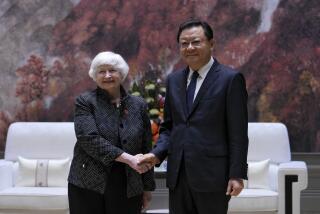Task Force to Combat Trading Violations
DETROIT — The Bush administration, confronted by a growing clamor over the loss of American manufacturing jobs, responded Monday by promising to crack down on U.S. trading partners that don’t play by the rules. At the top of its list was China.
Commerce Secretary Don Evans told a Michigan business group that the administration was creating an “unfair trade practices team” to combat cases of illegal product dumping, intellectual property piracy and other abuses that contribute to U.S. job losses.
Evans said the administration was focusing on China, which has become an aggressive exporter of products to the United States but has been slow in some cases to open its own markets to U.S. goods and services.
“I don’t think anybody’s going to question our resolve. I’m sure China will not question our resolve,” Evans told members of the Detroit Economic Club. “We’re serious about it, and they’ll know we’re serious about it.”
U.S. manufacturers have shrunk their payrolls for 37 consecutive months, shedding 2.7 million workers since mid-2000 although the economy has been growing since the end of 2001. Analysts say the drumbeat of layoff announcements is becoming an increasing political liability for the Bush team as the 2004 presidential election campaign begins in earnest.
“If he loses this election, it’s going to be because of the condition of the economy and the condition of manufacturing,” said University of Maryland business professor Peter Morici, former International Trade Commission chief economist.
Evans portrayed the new trade enforcement effort as one element in a broader White House strategy for dealing with the plight of U.S. manufacturers. Other initiatives, he said, include the efforts to curtail frivolous lawsuits, develop new energy supplies, reduce health-care costs and lighten the regulatory burden on business.
He said the campaign to open foreign markets to American goods and services and curtail abusive practices by U.S. trading partners would be expanded when he submits a comprehensive report on the state of U.S. manufacturing to President Bush later this month. The report was based on a series of meetings by Evans and other Commerce Department officials with factory operators across the country.
In those sessions, Evans said, “no country raised more attention as a source of concern than China.”
The Commerce secretary praised China for its constructive contributions to world diplomacy and international commerce. China imports more goods from the United States than many other countries, he added, but has “a long way to go.”
Under an agreement signed in 2001, for example, China agreed to let non-bank institutions establish financing arms so that their customers could purchase automobiles made in the United States and elsewhere. “We’re still waiting,” he said.
The Chinese government also promised free access to established distribution systems for American goods.
Evans said the administration would continue to encourage China to let market forces control the value of its fixed-rate currency, whose exchange rate is fixed by the government relative to the dollar. Many analysts consider the currency significantly overvalued and perhaps the biggest single contributor to America’s trade deficit with China.
He said U.S. manufacturers complained about piracy of intellectual property by Chinese firms, forced transfer of technology from businesses launching joint ventures in China, capital markets that are largely insulated from market pressures and other barriers to free trade.
He said commercial pirates in the city of Guangzhou sold counterfeit chewing gum, going so far as to copy Wm. Wrigley Jr. Co.’s trucks and driving the same distribution routes. When they called on Wrigley accounts, the pirates paid premiums to shop owners for accepting the bogus products.
“That’s not a pretty picture,” Evans said.
He said the unfair trade practices team would respond aggressively to trading abuses instead of waiting for affected industries to seek government intervention. That will enable it to act on behalf of smaller businesses that lack the financial resources and legal expertise to launch trade cases, he said.
The president’s critics wasted no time in finding fault with the White House initiative.
“The Bush administration’s attention to China’s trade abuses is 2.5 million jobs late,” said Connecticut Sen. Joseph I. Lieberman, one of the Democrats vying to unseat the president.
But the campaign drew praise from the National Assn. of Manufacturers, which said it “demonstrates that the Bush administration is serious about addressing the unique challenges facing U.S. manufacturing and the loss of jobs.”
More to Read
Inside the business of entertainment
The Wide Shot brings you news, analysis and insights on everything from streaming wars to production — and what it all means for the future.
You may occasionally receive promotional content from the Los Angeles Times.










